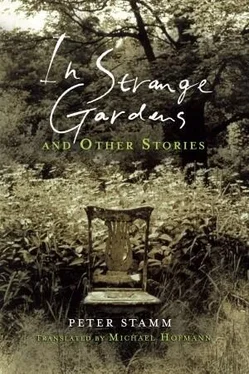The three brothers were quiet and serious. They didn’t seem to have any friends, though no one had anything to say against them. They didn’t attract attention to themselves, and if they did, then it was more through things happening to them than anything that they did. These latter occurrences, though, were of an odd weight, and sometimes of such a violent nature that the whole village talked about them. On one occasion, Elias and Thomas, the two elder boys, had set fire to an empty barn. It was never established why they had done it, but they never denied they had. On another occasion, the three brothers had between them killed a cat and had been seen doing so; a different time one of them had cut through the cable of the street lamp just opposite the stationery store. When the lamp duly plummeted down like a stone, it only just missed striking a bicyclist before shattering on the sidewalk. The brothers wrought their destruction with earnest and concentrated expressions, without particularly intending adverse consequences for anyone. When they were asked why they had poured hydrochloric acid over the teacher’s car, they said it was because they were curious to see what would happen. That same teacher then bent over backwards to prevent the case from coming before the courts.
Simon, the youngest of the three brothers, had gone to school with the next-door neighbor’s son. For a time, the two of them had been friends. Sometimes, Simon came around, and then the boys would play together, or read comics, until the neighbor packed them off outside for the fine weather. The boys never spent any time at Simon’s place. The neighbor wasn’t sorry. She was unable to picture that apartment over the shop, or imagine anyone living in it, except the invisible invalid.
Ruth’s father had died maybe ten years ago. He had driven into the canal by the feed mill. He had been found three weeks later. The car had lain in the canal, with the man inside it, for all of three weeks. No one in the village thought it was an accident.
On Simon, the word was later that he had been on drugs. There were stories that he spent half the year on an island in the Far East somewhere, and one day the paper announced that he had died, and there was something about a long illness, which gave rise to a new surge of rumor. Thomas had moved away, Elias had married and lived at the other end of the village, but in all the years of their being neighbors, the neighbor had never once seen him at Ruth’s.
Ruth was the complete opposite of her brothers. She had been terribly gentle as a child, and good at her schoolwork. She was a Girl Scout, she took part in various sports clubs, and was even in charge of one or another of them, and she was active in the Young Church. After school and right up to the time she got married, she helped her father in the shop. But she too was helpless against the darkness of it, and she too disappeared into the back room. When her father died, the family sold the business to a man who already owned a stationery store in the area. The mother stayed in the apartment over the shop. She had a nurse, and Ruth visited her almost every day.
The neighbor had been glad when Ruth moved into the house next door. She hadn’t gotten along with the previous people in the house because of some silly business that had happened years ago. On the day they moved in, Ruth and her family had gone around to introduce themselves, and the neighbor had immediately lost her heart to Ruth’s two little girls, who were well-behaved but as cheerful and lively as their mother.
Ruth set to work transforming the garden. She took out the bushes that sprouted on the edge of the property, shielding the house from the eyes of strangers, and in their place planted berries. She raised vegetables, and planted the flowerbeds so cleverly that there was always something in bloom. Her husband mowed the lawn — apart from that he was rarely to be seen in the garden. Ruth even set the grill going in the summer months, and carried meat into the house when it was cooked.
Such a nice family, the neighbor had often remarked to her husband, and she had been unable to understand it when one day she learned that the marriage was over and Ruth’s husband had moved out. At that, Ruth had for the first time broken down. Ruth, who earlier had endured all the blows of fortune and had never despaired, who had stood by her brothers after their worst misdeeds, and even after the death of her father had walked about the village with a proud and calm expression. It hadn’t happened suddenly but gradually, like those slow motion sequences in which the walls of a house break apart and collapse, until there was nothing to be seen but a great cloud of dust. The neighbor had been condemned to watch helplessly as Ruth now stood around in the garden, stooped and with a dull expression, holding her rake in her hand but quite paralyzed.
The neighbor put the card back on the sideboard. She opened the top drawer. There was nothing in it but table linens and napkins. In the second drawer she found some knitting, the beginnings of a pullover, presumably for one of the girls. She shut it, and when she stooped to open the bottom drawer she felt suddenly guilty, and hurriedly shut it again. She straightened up. Next to the birthday cards, there was a crumpled scrap of paper, a list of important items to remember. Carpet slippers, contact lens cleaner, nightgown, reading matter. The neighbor pocketed the piece of paper, possibly in order to throw it away, and then she left the room and left the house, and locked the door after herself.
Even July had been hot that year. Ruth had left the windows open overnight, and when she closed them in the morning it was cool indoors, and it stayed cool until midafternoon. But now that there wasn’t anyone there to open and shut the windows, the house had heated up from the attic to the basement. The air was stale and dry. Only in the kitchen, where the houseplants stood, was there the humid atmosphere of a hothouse.
It was quiet in the rooms. Sometimes the telephone on the landing rang six, seven, eight times, and once the muffled sound of band music penetrated the house. Someone in the area had turned ninety, and a brass band had turned out to play. The people stood around in the street, children perched on garden fences, grown-ups stood together and chatted in between tunes, and fell silent when the musicians had found their places and began again. They played briskly and without much feeling. They seemed relieved to be able to pack their instruments away. They might at least have put on their uniforms, the neighbor said to her husband, as they walked home.
At night animals found their way into the garden, mostly cats, but also the odd hedgehog, marten, or fox. Once, years before, the neighbor had seen a badger there, rooting in the compost. But no one apart from her had ever seen the badger, and she stopped talking about it when she sensed that no one else believed her.
One evening there was a storm. The tall pine on the other side of the street bent in the wind, and little birch twigs were blown onto the street. The neighbor stood at the window, looking out. One day the pine would surely fall; it was old and sick and should have been cut down a long time ago. But the apartments in the house opposite were short-term rentals, people kept moving in and out, and no one bothered about the garden.
As darkness fell, it started to rain. Rain flurries blew across the street and rattled against the windowpanes. The street lamp swayed in the wind; it seemed to have come to life, as it lunged around wildly in the darkness. The neighbor wondered what she would do if she saw a light on in Ruth’s house. Of late, there had been several break-ins. I won’t water the garden tomorrow, she thought. She turned on a light, and switched on the TV. By the time she went to bed the wind had eased slightly, but it was still raining.
Читать дальше












